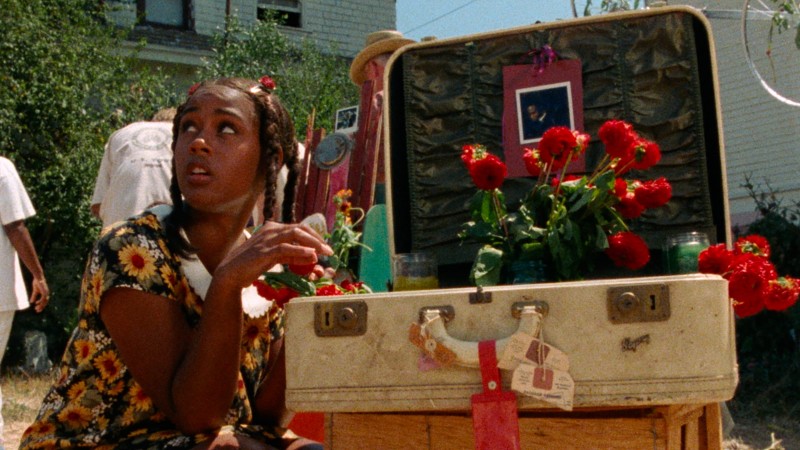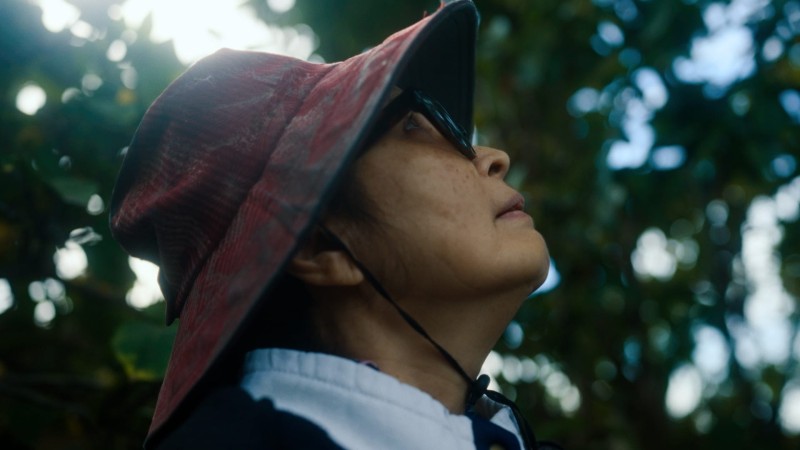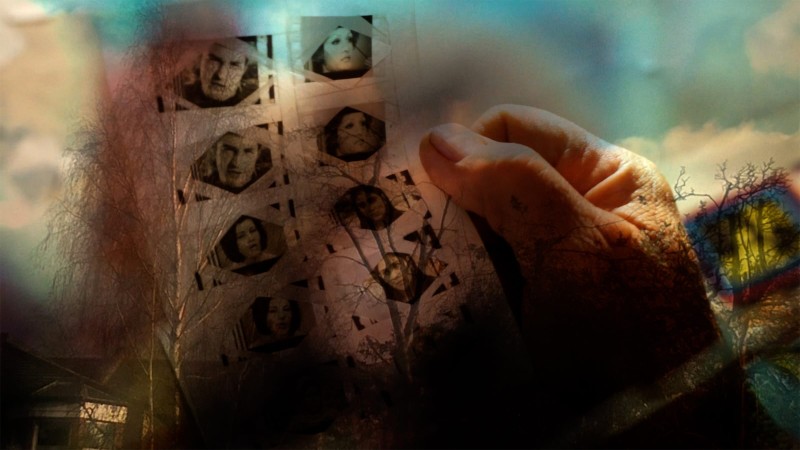Home Out of Range: A Conversation with Valeska Grisebach

No genre is as bound up with America’s conflicted self-image as the western. But despite being rooted in such a historically specific iconography, the genre has proven adaptable to a wide array of international settings, its influence having crept into the work of filmmakers as varied as Sergio Leone, Akira Kurosawa, and Alejandro Jodorowsky. In Western, one of the most acclaimed titles on the festival circuit last year, German director Valeska Grisebach pulls off a subtle variation on the western’s themes of individuality, community, and male aggression, using these timeless tropes to frame the cultural fissures in modern-day Europe. The film, which was made in close collaboration with an ensemble of nonprofessional actors, chronicles the tensions that arise among a group of German construction workers stationed in Bulgaria and the locals they encounter. When the enigmatic and tight-lipped Meinhard (Meinhard Neumann) finds a kindred spirit in a villager named Adrian (Syuleyman Alilov Letifov), he arouses the ire of his boorish boss, Vincent (Reinhardt Wetrek), who has already raised suspicions among the Bulgarians after harassing a local woman. The stage is set for high-stakes drama, but Grisebach evokes the peril—and beauty—of cross-cultural communication with a remarkable tenderness and restraint, complicating the genre’s traditional ideologies of good and evil, heroism and villainy.
While she was in town last year, Grisebach stopped by to talk with me about the long preparation process that went into making the film and her experience of discovering westerns in her youth.
What are some of your first memories of watching westerns?
As a child in West Berlin, I’d often watch them together with my father. It was part of our father-daughter connection. He loved westerns. One year, there were a lot of them on TV, usually with very poor dubbing. High Noon in particular was a film he wanted to see. We knew the film was going to be shown, and so it became this sort of date for the two of us. I was probably seven or eight years old. A lot of children have this kind of experience—traveling the world through film and literature.
Later I wanted to explore why this genre was so attractive to me. I definitely loved it more than other Hollywood genres. I loved how there was usually one setting, on the border between wilderness and society, where people were forced to make all these decisions about good and bad. It was interesting because every character I identified with was a male hero; I wasn’t identifying with the women, who were in the shadows. I also wasn’t actually sure that those were places where I’d want to live. But I did identify with the romantic ideals of the genre, the idea that you can find your personal destiny but that there always comes a point where you have to decide whether you’re in or out of society.
I’m still so interested in the genre because you can see and think and reflect on a lot of aspects of masculinity. The way the faces are shot: you have these faces that aren’t allowed to show emotion but you know that there’s so much going on inside. And then there’s this intense contact between men, these do-you-dare-to-look-into-my-eyes moments. It’s like a love story.
In Western, there are a few scenes of disarmingly tender emotional connection between the male characters. Were there moments from classic westerns that inspired this?
Yes. There’s Winchester ’73. I was always interested in westerns in which the main figures were not so cool. James Stewart is like a regular farmer boy in that film, but he’s on the road to revenge. There’s a night scene around a fire, and his buddy is asking him, can you go back after all this, can you work again with the animals? That part was very interesting to me—it’s like a seduction. And of course in My Darling Clementine there’s a lot of intimacy between Henry Fonda and Victor Mature. But I also like that in Rio Bravo you get this other kind of intimacy—it’s more like hanging out, with everyone drinking and smoking together. And everyone’s so fashionable!
Another element that Western shares with these films is the mystery that surrounds the characters’ backstories. A stoic male figure walks into town and you aren’t quite sure where he came from, why he’s there, what he’s been through.
I thought a lot about backstory. Writing the script wasn’t so easy for me. I usually start with themes and subtext and make a sort of vague intellectual construction, and then I try to find the surface. It’s like I have to hide the story and build it up in an associative way. All the ellipses are important to me—I want the viewer to have a chance to fill them in.
My main actor [Meinhard Neumann] was important for this. I was looking for this contrast between naturalism and artificial epic moments, and when I saw him for the first time, he looked so iconic, I felt like he had jumped out of an old western from the fifties. It helped me in creating something that looks natural but has an iconic feeling. He brings subtext immediately into the film—his face creates this fantasy of what might have happened to him. You think he could be a leader of a group, and at the same time it’s like he’s Joseph Conrad’s Lord Jim, full of his own fears and narcissism and maybe a bit of opportunism.

Since you put so much emphasis on casting in your process, I’m wondering how much actually ends up already in the script before you start shooting and how much is discovered later, with your ensemble.
I usually try to write in prose, like in a novel, not so much in dialogue. But I try to be very precise, to stimulate myself and everyone else. Every night when I’m in bed, I’ll rewrite the scenes. I want to give the actors a lot of different options—and if it’s not working, I have to try another way. But there’s a lot I discover on set. It’s important for me to internalize the script, but it’s also important to leave it aside.
I tried to create some moments of suspense. One of the things that I didn’t want or know how to handle was the idea of a showdown at the end. The genre was asking me: how will you do the showdown? And I kept thinking about it and I felt so bored. I had dealt so much with subtext, and I kept asking myself, what is the subtext at the end? It really comes down to how close can we come to another person—how much do we dare to come close, with all our weaknesses? Meinhard, because he’s in this strange place, can reinvent himself. Nobody knows him. But at some point, something breaks and he has to deal with his decisions.
How much did you think about these classic western archetypes when you were creating the characters? You pull off a tricky balance, capturing the complexity and particularity of these men while also evoking mythic masculine personas that harken back to another time and place.
We’ve all internalized so many myths, and there’s an expectation that life owes you adventure—that you are somebody. It’s so interesting to contrast this with concrete moments. I’d fallen in love with all the actors, so they were like these mystical heroes. But I also wanted to come closer to them, to smell and to touch and to feel their melancholy.
There was another guy who I thought would play the role of Vincent, but when I saw him together with Meinhard, there was something missing. Then I remembered meeting with the man who now plays Vincent, whom I adored in the beginning, though he was so shy. I gave them nicknames—he was Clark Gable, and Syuleyman was Clint Eastwood, and Meinhard was a bit like Gary Cooper. When I watched Syuleyman and Meinhard going into the woods, it was like a dance—there was a kind of synchronization—so it became clear they made sense together.
I think it’s because you’re so focused on this intimacy between your characters that the film is able to handle such big themes—xenophobia, the clash between Western and Eastern Europe—with a delicate touch. Were you conscious of this tension between the heaviness of the subtext and the subtlety of your approach?
I was happy when I found this premise of German construction workers living in a foreign country, because I felt that then I had something more ambivalent. I am always afraid when something is too direct—I don’t trust it anymore. For me it’s not easy to say that something is like this or like that. I was really interested in how xenophobia exists between the lines, how it isn’t so direct, and how this contrasts with the official ways of telling history in Germany. In the last few years, while doing research for my films, sometimes I’d do interviews and ask myself, did I hear that? I was in somebody’s kitchen once and they gave me a spoon with Hitler on it. So I wanted to explore these kinds of issues, but in Germany there are so many movies on this theme, so I hesitated.
How do you go about researching for a project like this?
Every filmmaker does research, so there’s nothing so exceptional about it, but I really like to write outside, to always have these interactions. I don’t like to write alone. I start with a mix of casting and interviews. I started doing interviews with both men and women about westerns, about what they were searching for and the duels they were fighting in their own lives. I also was looking for a kind of pinup moment, so I went out on the streets to see which men I could imagine on a horse. I set up appointments for interviews, about an hour each, using similar questions, but I’d start talking with people about different things, like horses and guns. And I tried to get in contact with people in Germany who had horses and guns. So I went to a horse market, and that’s where I found Meinhard.
Research can feel very adventurous, and at the same time, because you meet many different people, it creates this community. For me, this is the most beautiful part of filmmaking. On every film I have this problem: I love the preparation process, and then there is this moment of having to start the film. It’s very painful. But it’s always a question of how I can stay closer to the smaller scale of that preparation process. Research is the ground that the film is standing on, and for me filmmaking is really about getting in contact with somebody, something, the world.
Did your perspective on the western change as you were making the film?
At first I thought about the role of women in westerns and whether or not I should reflect my experience as a girl. But I think it would have been a totally different film if I had done that. I had to decide at some point what my interest was. I tried to give the women a bigger stage, but it always felt a little cheesy—it felt like and now here are the women also. I couldn’t get it right. And so I decided that my interest in the film really lies in masculinity, this theme of the male figure.
That makes me curious—what were the gender dynamics like on set?
It was actually really nice because everything had been on the table from the beginning: I am the woman who wants to make a western! I think the men felt that I wasn’t afraid of them, so there was a mutual respect. On the other hand, some of the supporting actors, who came from the world of construction, had a very strong sense of hierarchy, so sometimes it would be hard to be the boss, because they would start acting almost like children!
Are there other things that inspire you artistically, besides cinema?
Literature is very important to me: Steinbeck, Conrad, Jack London, Dostoyevsky . . . One book I read recently and really liked was Emma Cline’s The Girls. Her prose is so interesting, very much in between the lines, with a strong feminist view of the world and what it means to be a girl. I thought it was exceptional—she’s in her twenties, but she’s writing like a woman in her sixties or seventies. I feel very close to American literature, and that sort of makes me a typical child of West Berlin. My father grew up in an American sector, and he would tell me about his experiences with music and with the G.I.s. There was always this desire to reinvent himself.



